Here’s a deck for anyone to use if you want to give a quick presentation overview of the Agile Scrum Framework.
You can see scrum.org for the real deal info.

Here’s a deck for anyone to use if you want to give a quick presentation overview of the Agile Scrum Framework.
You can see scrum.org for the real deal info.
Mind stubbed out to article titles, phonic patterns, and dreams.
Half remembered. Half remembering.
What is lost? Branching growth? Dark webs?
One image across a gigasphere, one mind.
Opt in or wait. Differentiate.
Networks extend to horizons.
One last generation to claim mysterious pasts.
Until it moved into the stream, what remained?
This conversion to a mapped equivalent of things; this expression across a replicating jalopy, iterates beyond the left behind.
Shed the load queued up. Release every right.
In the clicking, pinching, scrolling, redundant, array of you
stub out your mind and let go.
Edenbourough Castle Pub, San Francisco, October 2017
Wish we could be with you in California. Here’s a special holiday video we made for you:
It was eight years ago on election evening that my father passed away. I had been living in Los Angeles and my first child was only 6 weeks old when my mother called and asked that I come home to Boston. I left my wife and new born daughter alone in L.A. and flew home to see my father one last time. He had been rapidly declining over the past several months. Years of diabetes had ravaged his extremities; in the last few months of his life he was forced to become a double amputee due to neuropathy in both his legs. He lay in hospice all week before the election of Barack Obama. His bed was setup in the living room. My family flocked around as he came in and out of morphine dreams. We prayed with him, remembered with him and said our goodbyes to him as election day approached.
My father was a Democrat. His older brothers and sister having gone off to fight in WWII, he stayed home listening to FDR’s fire side chats on the radio with his immigrant parents. His oldest brother, Robert, never came back. His own father had become a citizen by signing up to fight in WWI as an American soldier. There was a lot of sacrifice and commitment to the mythos of America in my Dad’s early life. It didn’t help that he was an idealist with a penchant for fantasy. He loved tales of revolutionary war characters and the grand symbols they represented of rationalism, freedom and rebellion in the face of tyranny. He urged us all to read Johnny Tremain (which come to think of it, I never did…so I just now ordered it on Amazon.)
My Dad had an idealized view of American egalitarianism and civic justice.He held the “Bill of Rights” to be sacred. I imagine that he was too busy trying to feed 7 children during the sixties and seventies to be much phased by Watergate, Vietnam and the plodding end of American innocence. The subtleties of politics were not for him. He saw politicians as decent protectors of justice or rat bastards (and usually on party lines.) Like many, he saw things in broad strokes and tended toward extremes. It was rage or joy, love or hate, understanding or complete bewilderment. I don’t mean to paint a picture of him as a shallow dullard. On the contrary, he loved to read, paint, listen to classical music…I think it just came down to the fact that he was an honest hard working person and in his experience the choice between right and wrong was a clear and unambiguous choice.
My eldest sister came for a visit this weekend prompting memories of my father. She told a story about my father being in the hospital after his first leg amputation. As the story goes, he was alone in his hospital bed the night after the surgery when he was awakened by the urge to pee. He realized, “how am I going to get to the toilet with only one leg?” So he buzzed for the night nurse to help him, but no one came. He tried yelling out, but no one heard. It was becoming an emergency.
He remembered that he had a phone next to the bed, so he picked it up and did the next logical thing in his mind. He dialed 911.
“911 Operator what is the nature of your emergency?”
“Yes, hello. My name is John Paradis and I am a patient at Mt. Auburn hospital,” my father said calmly.
“And what is your emergency sir?”
“Well, I have had my leg amputated today and I am not able to get out of the bed. I have buzzed for the nurse but no one is coming and I have to pee.”
“That’s your emergency?” says the 911 operator.
“Yes,” says my father.
“What is your room number at Mt Auburn sir?”
And so indeed the police were alerted, they contacted the hospital directly and in short order they came to aid him in his emergency. The next day he was a legend among the hospital staff, but to my father it was a natural exercise of civic rights. They say protect and serve and he takes them at their word.
The early 2000s were quite difficult for my father and for those who loved and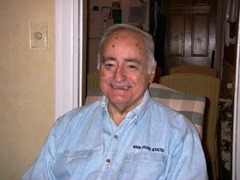 cared for him. He battled stroke, heart disease, diabetes and neuropathy as mentioned. But worse, he did it all while suffering through the presidency of George W. Bush and his cronies who proclaimed that they would be forced “to work on the dark side” and in so doing managed to dismantle much of the bill of rights that my father held so dear. The last year of his life he spent fairly cognizant of the world around him and strongly disappointed in the U.S. government. The quick ascension of Barack Obama to the democratic candidacy for the U.S. Presidency was a hopeful murmur in the background during his last months.
cared for him. He battled stroke, heart disease, diabetes and neuropathy as mentioned. But worse, he did it all while suffering through the presidency of George W. Bush and his cronies who proclaimed that they would be forced “to work on the dark side” and in so doing managed to dismantle much of the bill of rights that my father held so dear. The last year of his life he spent fairly cognizant of the world around him and strongly disappointed in the U.S. government. The quick ascension of Barack Obama to the democratic candidacy for the U.S. Presidency was a hopeful murmur in the background during his last months.
Obama’s election, for all that one may criticize of his presidency, was a moment of historic pride and rekindled faith in the American system which seemed to have fallen so far at that point in time. For many, including my father, his candidacy was a desperately needed sign that things were not so irrecoverable. He hung on all the way to election night until we were finally able to tell him that Barack Obama had been declared President of the United States. A much awaited exhale occurred across the country, and for my father it was the last. He died just around midnight on election day.
I am no great fan of the American political system – there is much that needs fixing and seems unfixable. Perhaps I will feel better after reading Johnny Tremain. I do carry the reverence for civic duty that my father and mother bestowed on me and a faith that people involved in local governance are rational and respectful of neighbors. We all could use more help fighting against our tendency toward dominant paradigms and adversarial procedures. Modeling respect for one another, tolerance and inclusiveness of perspective in the public square is much diminished. In my opinion it is just bad parenting, and I look forward to the day when some well raised adults will take over governance. I hope my children and their peers will contribute to this.
The strict father model is a lazy model in my opinion and tends toward short sightedness and prejudging. I go there a lot, but I know when I do. I have found that being a nurturing parent doesn’t have to mean you are overly permissive but it means you have to be open to self-analysis and change.
I am grateful for the presidency of Barack Obama, and I think my father would have been happy with how he conducted himself. For sure, it was not a perfect job and much was left on the table, but I think he managed to bring some decency and respect back to the office. As his wife Michelle says, “we go high when others go low.” My father would appreciate that tremendously. Barack Obama seems like a very good father himself and I am so grateful that he and his family will make it out of this relatively unscathed. I know he prayed to God for this. I am glad God is still listening.
My father was the parent of six daughters and one son. His children went on to produce an overwhelming number of female offspring. He would have 12  granddaughters and 3 great granddaughters right now. Two of those girls are mine. They are all fierce, all brilliant, all capable and all ready to be respected for the unique powers and perspectives they can bring to bare. The men folk have lead us in an interesting direction over the last 2000 years. I am hoping we can see a shift now toward balance and that this election is historic demarcation of that beginning.
granddaughters and 3 great granddaughters right now. Two of those girls are mine. They are all fierce, all brilliant, all capable and all ready to be respected for the unique powers and perspectives they can bring to bare. The men folk have lead us in an interesting direction over the last 2000 years. I am hoping we can see a shift now toward balance and that this election is historic demarcation of that beginning.
With these principals in mind, I stand ready to do my civic duty. I know my dad will be staying up to see the outcome of this one too.
I was very gratified that my band was able to pull off a David Bowie cover and further gratified when it made it to our one and only formal album. Here’s the track, “Five Years,” by David Bowie:
. Covered by Bergamot The Band, live at Toad sometime in the early 2000s
Thank you David Bowie!
I like BBQ ribs for sure. Done right, they are a special treat of texture, smell and complex flavor. There was a time when I lived in the same town as “Blue Ribbon BBQ.” and smoked ribs were on the menu at my house more often then they should have been. But now that I have tried my hand at them a few times, what I really like about ribs is the assembly and execution. For me rib smoking is a great example of an empirical control process.One of my favorite process models. ![]()
Empirical process is defined as having attributes of visibility(transparency,) inspection and adaptation. From a software and information systems business analyst/project manager perspective, it is always interesting to spend time studying process methodology and remind yourself that implementing technical solutions means you are operating in the realms of the engineering discipline. So much of what we do involves human interaction, politics, competing priorities, budget considerations and so on. A perfect system is not possible. Imperfection is a factor when you are not God.
Statisticians and engineers have that lovely term to help figure out just how imperfect something is; they call it “variance.” When you measure a process, let’s say heat applied to ribs over time, you will get a variance of temperatures. In my case (using a tinfoil packet of woodchips in a gas grill) there is a going to be a big distribution of imperfect temperatures over time. I want my mean temperature to be somewhere around 225 degrees F. If I take a measurement every 15 minutes over 4 hours, I find out my mean temperature is 219F and a standard deviation (AKA Sigma) of 15F. 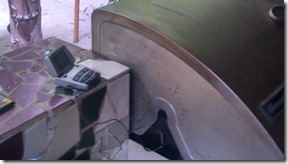
The low average temp indicates I will likely need more time for our ribs to reach the internal temperature goal of 180 to 190 degrees Fahrenheit. If delivery time is an issue, then I will have to adjust my process. I have an acceptable variance if time is not an issue. However, if the average temp is under 180F, then I am not likely to reach my internal temp goal. In this case, I would say too many measurements are outside of the allowed variance deviation points. Inspection shows my process is out of control, and I must adapt a to bring it back in control.
“Six Sigma,” is a set of procedures and artifacts embraced by GE and now in the popular culture. Literally, six sigma refers to a manufacturing quality goal where measurements show a process is 99.99966% free of defects. All this measuring stuff is the “inspection” part of empirical process. William Edward Deming is often sighted as a key figure championing empirical process in business and manufacturing. The PDCA cycle, or so called “Deming Cycle,” defines a continuous improvement business process of PLAN – DO – CHECK – ACT. Checking, measuring, testing, studying are all part of the inspection pillar. Transparency includes the procedures and artifacts used to plan and do the the work and adaptation is what we do when we act to improve a process or bring it back in line with the commonly understood goals.
“My mother has some friends in town on Sunday and wants to use our house for dinner,” says my wife.  “You should make some BBQ.”
“You should make some BBQ.”
Thus the BBQ project is underway. I’ve got some stakeholders (really they’re going to be rib-holders):
Here’s my wife’s story (paraphrased into somewhat of a user story of course):
“As the hostess of this event, who also has to be in class all day that day, I want there to be BBQ food and roasted veggies enough for my mother, her friends, the kids and my sister’s family AND I want you to coordinate with my mother so I don’t have to stress out and everything will be perfect when I get back from class.”
Um, OK…it looks like my wife is in the executive sponsor role. This story might even be considered an epic. We could also call it a high level business requirement – my wife is all business.I do see that the rib-holder list is growing: kids, wife’s sister’s family.
It seems like the real subject mater expert for this BBQ is going to be my wife’s mom. All the rib-holders are going to be rib-eaters too (AKA users.) Here’s my mother-in-laws’ stories:
“As an event planner I want food and atmosphere to be ready around 6:00 PM, so that guest can feel comfortable when they arrive at that time.”
“As an event planner I want to make sure there are roasted veggies, a salad, BBQ ribs and chicken so that we have vegetarian options and enough food for the adults and children.”
Anyway, you get the idea. Planning to deliver these stories with the team, we decide to break up the veggie and meat story. My mother-in-law is going to acquire and prep the vegetables, and I am going to do the meat. The transparency principal must follow through the whole process. We use text messaging to check in at each step. I estimate the quantity of meat and other ingredients. After I pick them up at the store, I check-in with my wife and mother-in-law. My mother-in-law confirms she has the veggies and will be prepping them for delivery just and roasting just before guest arrive.
I know all the work and materials that will be required to achieve the goal and I have estimated the duration. We have a plan and we have started doing. Transparency is key to these initiation processes and will be a critical guide as we move forward into the do-check and check-adapt activities.
There is a flow, but the transparency, inspection and adaptation principles are active throughout the process. The Deming Cycle gives us more sense of the flow, but the principles are always active when planning, doing, inspecting and adapting. For now, however, let’s take a look at how inspection influences the do-check process. Opportunities for inspection must be built into the process and the team must be ready for adaptation.
After I get the meat and check that it is the right amount based on our target number of users, I start by preparing the ribs. I know from research and previous trials that the ribs are going to take 6 – 8 hours on my jury-rigged smoker. So I get up early to start the procedure.
At the market, I find full racks trimmed in the St. Louis style. The rib tips and point are removed from the full spare rib. The membrane is still attached to the ribs however, and this tough piece of thin material needs to be removed. The slow heating process breaks down all the fat on the ribs, but it will never melt away this membrane. Some folks choose to score the membrane and leave it on, but it’s really easy to remove the full piece and that is the way to go.
The best method I have found to remove the membrane is by wriggling the back end of a spoon in under it and puling away from the meat. Once you have a good portion of the membrane off the meat, grab it with a bit of paper town and gently pull. It should come off smoothly in one piece.
Next, I lay down a base of kosher salt to coat the ribs on both sides. Mustard goes on next as a lovely way to bind our spice rub. When inspecting ingredients the night before, I noticed that mustard reserve were dangerously low. I had to make an adaptation to my plan.
Heading out to the market late night or early morning was not optimal. I managed to locate some mustard seed, mustard powder and apple cider vinegar in the kitchen and added those ingredients in random amounts to the existing mustard. I gave it a shake, put it back in the fridge and crossed my fingers that it would be good enough mustard the next morning. It worked!
After slathering on the extended mustard, I start to apply my rub. One of t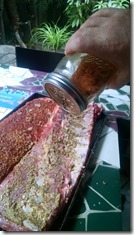 hese days I suppose I need to settle on a very specific rub recipe, but I usually wind up putting it together with spices on hand.
hese days I suppose I need to settle on a very specific rub recipe, but I usually wind up putting it together with spices on hand.
You can lookup rub recipes on the net. You’ll see most include brown sugar, paprika, black pepper, cayenne, garlic, salt, cumin, and so on. Some things I have found helpful include trying to grind up any whole spices myself (such as cumin seed) and being careful not to over salt. I’m putting down a layer on the meat, so I don’t like to add too much salt (or any at all) to my spice rub. I also found that putting the spice rub into a mason jar with a bunch of wholes punched in the top is a great way to shake it on the meat.
When the ribs are all prepped up with the spice rub, they are ready for smoking. A quick inspection of the time and confirmation of the agreement on what “done” means with my wife before she takes off for class shows that we are on target with the food backlog items. It rained last night however, so the story about making folks feel comfortable is going to need some adaption since the outdoor seating got all wet. I’m hoping to put some team members on that activity since we all own the backlog of things to do.
Since I have a somewhat hokey method of smoking meat, there is a lot of opportunity for adaptation in the process. This is where the incremental and iterative recommendations for application of empirical process come into play. It turns out this is not my first sprint to deliver smoked meat on my gas grill. In the very first iteration I had a lot of problems getting any smoke and produced some so-so ribs based on reviews provided by the rib-holders.
During a retrospective of that first sprint iteration, I realized some research and testing would be required to get the smoke right. The next round, I just tested the smoking and heat control method without trying to cook any meat. In a third sprint I delivered a real useable product (smoked biscuit) of high quality with top reviews from the users. This time around I have a strong comfort level with the process, but a lot of the more dynamic aspects of the check-act adaptation principals come into play at a micro level here.
The first thing to understand when converting your gas grill to a smoker is that the heat and smoke will be on one side and the meat being smoked will be on the other. As in the photo above, iterations have shown me that pulling the grate up from the fire side makes managing the smoker components a lot easier. For the smoker, I am basically going to use some heavy duty aluminum foil with holes poked in it.
Iterative process showed me that just putting wood chips in the foil by themselves was not heating the wood chips enough to where they would begin to smoke. I need to prepare some charcoal briquettes to just started and add them to the foil packet. Next, I add my wood. In this case I am using some dry apple chips, wet apple chips and some chunks of plum tree that I got from the nursery school where I am groundskeeper this year.
The gas grill burner helps me to regulate the temperature in the grill and the briquettes provide the right amount of heat in the foil packet to get the wood smoking. I also noticed through iterations that the temperature gauge on my grill is not very accurate, so I have a thermometer setup to track the grill temperature. The smoker part of this affair is really the one that required the most adaptation through the various sprints.
I know there are really cheap smokers on the market, and devices you can use to monitor and control your weber grill to keep the right smoker temperature. 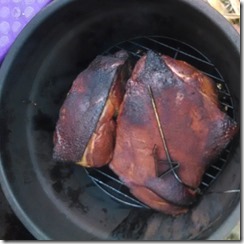 For the serious smoker, I am sure those are much better ways to go. But adapting existing systems like this is just fun. Heck, I even had a smoker put together from a heating plate and a terracotta planter. The picture here shows some pulled pork smoked in my old planter smoker. I converted that to just be a planter, because it was too difficult to maintain the proper temperature.
For the serious smoker, I am sure those are much better ways to go. But adapting existing systems like this is just fun. Heck, I even had a smoker put together from a heating plate and a terracotta planter. The picture here shows some pulled pork smoked in my old planter smoker. I converted that to just be a planter, because it was too difficult to maintain the proper temperature.
With my smoker packet all ready to go, the ribs all prepped up and the grill pre-heated as best possible – it’s time for the cooking process to begin.
The goal mean temperature we are shooting for is about 225 degrees Fahrenheit. I know this is going to vary significantly across the next 6 to 8 hours. About every 30 minutes, I must replace the wood in the smoker packet and every time I do that the temperature drops down to about 180F or 190F. I am aiming for a good 4 hours of smoke on the ribs and afterwards I can keep the mean temperature pretty constant to finish them off.
From this point forward, as I noted, inspection happens on the half hour. I must keep an eye on the temperature gauge and watch for the grill to spill the billowing smoke as it 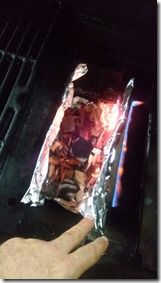 should. During one inspection, for example, I noticed the grill was not smoking and the temperature gauge was climbing to near 300F. I had to quickly adapt something for sure. Opening the grill cover, I saw my smoke material had caught fire! Not good. The cover of the smoker packet had come undone and too much oxygen was igniting the wood. I had to tamp out the fire and make sure the cover of the foil packet was secure.
should. During one inspection, for example, I noticed the grill was not smoking and the temperature gauge was climbing to near 300F. I had to quickly adapt something for sure. Opening the grill cover, I saw my smoke material had caught fire! Not good. The cover of the smoker packet had come undone and too much oxygen was igniting the wood. I had to tamp out the fire and make sure the cover of the foil packet was secure.
Well, our rips came out a real treat. I neglected to take a photo when they were done, but they looked something like the shot below. I am happy to say that the end users devoured the ribs during our sprint review over many accolades. The quality was top notch and I was quite satisfied with the results. During our 8 hour sprint, we had to adapt to many things which came to light via use of our transparency and inspection techniques. We had some bar snacks and drinks ready for the guest who arrived early. We had veggies on reserve for the unexpected additional vegetarian guests who showed up later. Everything turned out pretty well.
I suppose a retrospective includes some good information such as two wracks of St. Louis ribs will feed about 6 to 8 adults. We need to have a sweet or smokey BBQ sauce on hand for folks who can’t take the heat. Other than that, I think the process is down pretty well and we are ready for the next project. Smoked turkey perhaps?
On the Mat
At the start with fear beside,
flat, fat and taught.
Arms and legs and trunk contract
behind imprisoned thought.
To Gods-
head bowed heart lifted.
In teachable postures.
Let go to be guided.
The world is too much with us.
Yet here the center’s found.
Reclaim the dwindling powers.
To length, breadth and width we’re bound.
Bhandas contracting and arching restraint.
Desperate, subtle swinging.
Drips and drops a yoga of in.
The blood, the light all rushing.
Now on the mat,
puddles of death explored,
entangling the farthest star,
resistance relinquished…restored.
-Jack Paradis
Los Angeles 2014
Planning my next trip across the U.S. This time it’s got to be speedy.
I think this will be my route:
They who would give up essential Liberty, to purchase a little temporary Safety, deserve neither Liberty nor Safety.
-Ben Franklin
I was listening to yet another plead for good people to step away from Facebook because of privacy issues. This time the plead is motivated by yet another encroachment on privacy called the Facebook “Listening” feature an audio identification tool that records sounds in the room when you post on your phone.
The Benjamin Franklin quote above always came to mind for me during the post 911 congressional freak out, when most of congress agreed to wipe their assess with the bill of rights. It struck me as very un-american. It made me sad even, because my dad had always proclaimed the importance of the bill of rights. It seemed like we were being reactionary cowards and abandoning the principles of freedom, liberty and equal justice (even though I know we only ever aimed at these things and didn’t really have them, it seemed now that we were spitting in the face of our highest ideals…I’m not a libertarian, but I share this view of privacy with libertarians.) But then came Gmail, Mint, Facebook and the rest. Where we pretty much agreed to abandon many of our rights to privacy.
Instead of giving up privacy for a little security, we are giving it up in order to participate in the new public square and to have access to free stuff. It’s weird, but it seems an inevitable march. Frontline has a nice piece about this called “Privacy Lost.” As a counter point, Tim O’Rielly has this perspective. I think some of Tim’s points are a bit flawed, like where he says that people don’t have to use it if they don’t want to. I never liked that self-determination argument too much. It’s just used to justify a lot of misery in my opinion.
I am not quite sure what my thesis is with all this. It’s just some interesting bits about the state of politics, privacy and technology in these random times we are living.